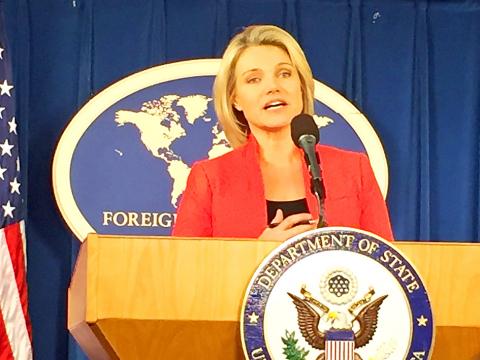The US on Thursday said that its policy and commitment toward Taiwan remain unchanged, despite the removal of the Republic of China (ROC) national flag from two US government Web sites.
The US remains committed to its “one China” policy based on the Three Joint Communiques and the Taiwan Relations Act, US Department of State spokeswoman Heather Nauert said at the Foreign Press Centers in Washington.
“We consider Taiwan to be a vital partner, a democratic success story and a force for good in the world. Taiwan shares our values and has earned our respect, and continues to merit our strong support,” she said.

Photo: Nadia Tsao, Taipei Times
Despite her words, there was no explanation as to why the US removed the flag from the government Web sites.
Presidential Office spokesman Sidney Lin (林鶴明) said the US is Taiwan’s most important partner in the international community, adding that the long-standing good relations between the two nations are of great importance to Northeast Asia.
Lin also expressed appreciation for US support of Taiwan in all fields, saying that as a constructive member of the global community, Taiwan would continue to contribute to peace and prosperity in the region.
Local media on Wednesday reported that the ROC flag had been removed from the official Web sites of the US Department of State’s Bureau of Consular Affairs and the Office of the US Trade Representative, causing the Ministry of Foreign Affairs to protest the unexpected move.
Ministry spokesman Andrew Lee (李憲章) said Taiwan is “disappointed” by the removal of its national flag from the Web sites, and called such a move “unthinkable” and “unacceptable.”
Taiwan has expressed its grave concern over the matter to Washington, he said.
Over the past few months, Taipei has held talks with Washington over its decision to remove the ROC flag from the department’s Web site in September 2017, he added.

CHAOS: Iranians took to the streets playing celebratory music after reports of Khamenei’s death on Saturday, while mourners also gathered in Tehran yesterday Iranian Supreme Leader Ayatollah Ali Khamenei was killed in a major attack on Iran launched by Israel and the US, throwing the future of the Islamic republic into doubt and raising the risk of regional instability. Iranian state television and the state-run IRNA news agency announced the 86-year-old’s death early yesterday. US President Donald Trump said it gave Iranians their “greatest chance” to “take back” their country. The announcements came after a joint US and Israeli aerial bombardment that targeted Iranian military and governmental sites. Trump said the “heavy and pinpoint bombing” would continue through the week or as long

TRUST: The KMT said it respected the US’ timing and considerations, and hoped it would continue to honor its commitments to helping Taiwan bolster its defenses and deterrence US President Donald Trump is delaying a multibillion-dollar arms sale to Taiwan to ensure his visit to Beijing is successful, a New York Times report said. The weapons sales package has stalled in the US Department of State, the report said, citing US officials it did not identify. The White House has told agencies not to push forward ahead of Trump’s meeting with Chinese President Xi Jinping (習近平), it said. The two last month held a phone call to discuss trade and geopolitical flashpoints ahead of the summit. Xi raised the Taiwan issue and urged the US to handle arms sales to

State-run CPC Corp, Taiwan (CPC, 台灣中油) yesterday said that it had confirmed on Saturday night with its liquefied natural gas (LNG) and crude oil suppliers that shipments are proceeding as scheduled and that domestic supplies remain unaffected. The CPC yesterday announced the gasoline and diesel prices will rise by NT$0.2 and NT$0.4 per liter, respectively, starting Monday, citing Middle East tensions and blizzards in the eastern United States. CPC also iterated it has been reducing the proportion of crude oil imports from the Middle East and diversifying its supply sources in the past few years in response to geopolitical risks, expanding

Pro-democracy media tycoon Jimmy Lai’s (黎智英) fraud conviction and prison sentence were yesterday overturned by a Hong Kong court, in a surprise legal decision that comes soon after Lai was jailed for 20 years on a separate national security charge. Judges Jeremy Poon (潘兆初), Anthea Pang (彭寶琴) and Derek Pang (彭偉昌) said in the judgement that they allowed the appeal from Lai, and another defendant in the case, to proceed, as a lower court judge had “erred.” “The Court of Appeal gave them leave to appeal against their conviction, allowed their appeals, quashed the convictions and set aside the sentences,” the judges